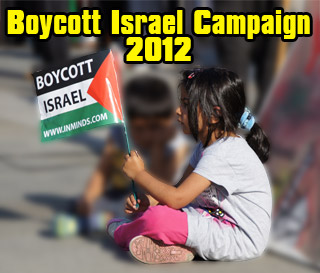
 Innovative Minds © 2014. All Rights Reserved. www.inminds.co.uk | ||||
T&G urges a ban on Israeli goodsBernard Josephs, Jewish Chronicle The campaign to boycott Israel was widened this week as members of the Transport and General Workers Union prepared to vote on a motion calling for a ban against all Israeli products. The move, to be considered by delegates representing the TGWU’s 800,000 members at their annual meeting next week, could result in millions of trades unionists coming under instructions to impose an embargo. Such actions have already been approved by the 1.3 million strong Unison and by the National Union of Journalists. Meanwhile UCU, the academics’ union, may ballot its members over sanctions.
Israel is very intolerant and sometimes its behaviour is not dissimilar to that of the Nazis..
Eric McDonald, The TGWU’s boycott motion has been proposed by car-industry workers at its Birmingham branch. It “deplores the actions” of Israel towards the Palestinians and accuses it of failing to recognise the “legitimate aspiration of a Palestinian state”. The motion specifically calls upon the conference to “support a boycott of Israeli products and goods” and calls on the government to take a “stronger stance in support of the Palestinian people”. Members of the Trade Union Friends of Israel said they were hoping to persuade the union to drop its boycott move, and would be seeking talks not only with TGWU leaders but also with the proposers of the motion. However, Eric McDonald, the union’s Birmingham branch secretary — who said he had never been to Israel or the Palestinian Authority areas — pledged that there would be no backtracking. “Boycotting worked against South Africa and the motion was approved unanimously by the 30 members of the district committee,” representing 16,000 members. “Israel is very intolerant and sometimes its behaviour is not dissimilar to that of the Nazis,” he told the JC. “Israel, like any other fundamentalist religious state, abuses groups that are different.” This also applied to Hamas, he accepted.
Boycotting worked against South Africa and the motion was approved unanimously by the 30 members of the district committee..
Eric McDonald, The backlash against the boycott continued in the unions and in Parliament. More than 250 members of the National Union of Journalists signed a petition calling on their union to drop its boycott resolution. Among them were a large group of BBC broadcasters including foreign correspondents Hugh Sykes and James Reynolds and political correspondent Reeta Chakrabarti. Other signatories included The Guardian’s Middle East correspondent Ian Black, The Independent’s Israel correspondent Donald MacIntyre and ITN’s father of chapel (shop steward) Dan Wright. In a letter to The Guardian, 32 members of Unison, including national executive member Alison Brown, said that as “democrats, socialists and supporters of an independent Palestinian state we oppose a boycott against Israel”. Such a move, they said, would “strengthen the sense of being under siege in a world of enemies which is a strong element in the power of the Israeli right”. More than 100 MPs from all sides of the House of Commons had this week signed a parliamentary motion branding the UCU vote as “repugnant”. It said that boycotting Israeli educational institutions and academics would damage Britain’s reputation “and does nothing to promote peace in the Middle East”. Source: http://www.thejc.com/home.aspx?ParentId=m11s18&AId=53530&ATypeId=1&secid=18 Also Of InterestPage URL: http://inminds.com/article.php?id=10152
|
|
Support Us
If you agree with our work then please support us.Campaigns INMINDS Facebook Live Feed Latest Video's
INMINDS Twitter Feed Tweets by @InmindsComFeatured Video's
You need Flash player 8+ and JavaScript enabled to view this video.
[all videos (over 200)..] Featured MP3 Podcast  "For most journalists, whether they realize it or not, are groomed to be tribunes of an ideology that regards itself as non-ideological, that presents itself as the natural center, the very fulcrum of modern life. This may very well be the most powerful and dangerous ideology we have ever known because it is open-ended. This is liberalism." Campaigning Journalist and Film-maker Socialism 2007 Conference, Chicago [43min / 21Mb] [all podcasts..] Newsletter Feedback |
 |
 |
















































